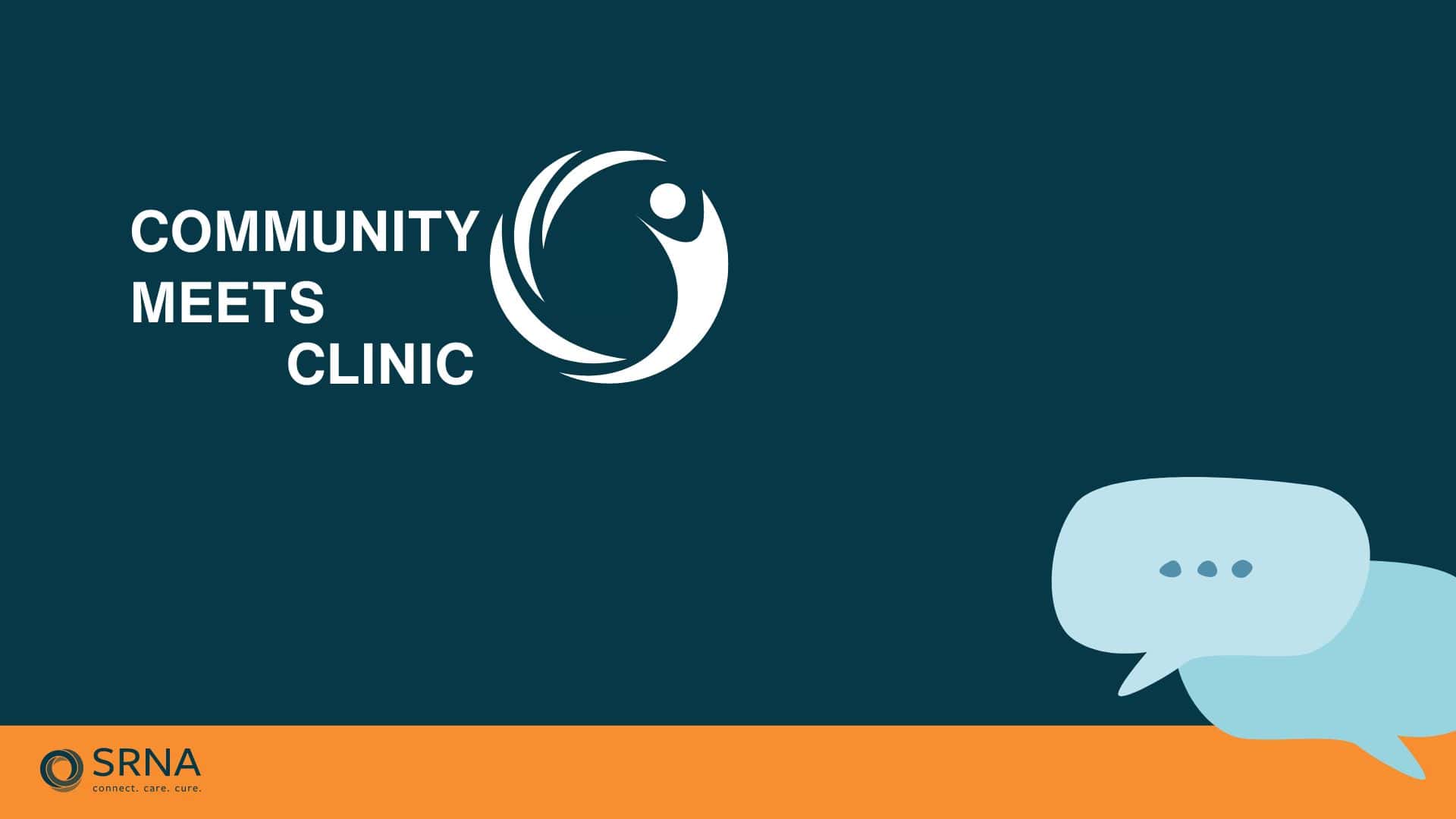Community Meets Clinic – Dr. Cristina Sadowsky
March 11, 2025
The “Community Meets Clinic” podcast series introduces clinicians and healthcare personnel specializing in rare neuroimmune disorders. In this episode, Krissy Dilger of SRNA was joined by Dr. Cristina Sadowsky from Kennedy Krieger Institute in Baltimore, Maryland. Dr. Sadowsky shared her journey to become a physician and her focus on spinal cord injury rehabilitation [00:02:26]. She discussed the Kennedy Krieger Institute International Center for Spinal Cord Injury’s comprehensive care approach, which includes long-term and specialized treatments for both pediatric and adult patients [00:07:00]. Dr. Sadowsky concluded with insights on what keeps her motivated and her hopes for advancements in the treatment of rare neuroimmune disorders [00:13:51].
00:00 Introduction
00:52 Meet Dr. Christina Sadowsky
01:35 Dr. Sadowsky’s Journey to Medicine
02:41 Focus on Chronic Spinal Cord Injury Care
05:49 Research and Innovations in Spinal Cord Injury
07:32 Overview of the Kennedy Krieger Institute
14:38 Personal Insights and Self-Care
17:09 Advice for Patients and Families
20:49 Hopes for the Future of Neuroimmune Disorders
22:49 Conclusion and Acknowledgements
Transcript
[00:00:03] Krissy Dilger: Welcome to the “Community Meets Clinic” series, a collaborative podcast to introduce clinicians, clinician scientists, and health care personnel working directly with individuals and families facing a rare neuroimmune diagnosis. Hear directly from those in the clinic and connect with the individuals whose focus is promoting quality of life for those diagnosed with a rare neuroimmune disorder.
[00:00:28] SRNA is a nonprofit focused on support, education, and research of rare neuroimmune disorders. You can learn more about us on our website at wearesrna.org. “Community Meets Clinic” is sponsored in part by Amgen; Alexion, AstraZeneca Rare Disease; and Genentech. My name is Krissy Dilger, and I moderated this episode.
[00:00:54] Today, we meet Dr. Christina Sadowsky, a clinician from Kennedy Krieger Institute in Baltimore, Maryland. Dr. Sadowsky is the Clinical Director of the International Center for Spinal Cord Injury at Kennedy Krieger Institute and an associate professor of physical medicine and rehabilitation at the Johns Hopkins University School of Medicine. You can view her bio in the podcast description.
[00:01:19] Welcome and thank you so much for joining me today, Dr. Sadowsky. I’m excited to speak with you and learn a little bit more about you, as well as the International Center for Spinal Cord Injury at the Kennedy Krieger Institute. So just to start, can you tell me a little bit about yourself and what led you to become a physician and, in particular, focus on physical medicine and rehabilitation?
[00: 01:50] Dr. Cristina Sadowsky: Yes. Well, thank you for having me over. This is exciting. I love the Siegel Rare Neuroimmune Association. It’s been part of the fabric of what I do for a living for the last 20 years, so I’m very grateful to share the time with you.
[00:02:09] You asked me what made me decide to be a physician. I don’t know. I was five when I decided to be a physician. I never wanted to be a dancer or artist. I always wanted to be a doctor. So, this is a lifelong passion. This is a career, not a job. This is my mission in life, to be an empathic, caring individual, so being a physician fits right in.
[00:02:43] What made me enter the field of spinal cord injury? I had two very good mentors when I was at Washington University School of Medicine in Saint Louis. I had a clinician as a mentor, Dr. Oksana Volshteyn. She inspired me to be passionate about the field. And then I had Dr. John McDonough who was an MD PhD, who lit a fire on discovery in the field. So, I’m always going to support people looking for multiple mentors because having smart people with passion that direct your career is the best thing in life.
[00:03:32] Krissy Dilger: Awesome. And so, you work with people with spinal cord injury mostly. Do you have any particular interest areas that you’re working on in research or a piece of research you have conducted in the past that you are proud of?
[00:03:49] Dr. Cristina Sadowsky: Yes, to all of the above. So, I focus on the chronic part of spinal cord injury. There are a lot of centers that are well equipped to deal with the acute spinal cord injury/disease. So, the acute onset of paralysis that’s related to the spinal cord. But 20 years, 20 something years ago, when I started, I realized that the system was specifically made to take care only of that initial period, and then people with paralysis would be left out to fend for themselves in the wide medical community.
[00:04:36] Having primary care physicians that don’t know anything about neurologic changes be the providers of medical care. And because I was trained in internal medicine, and I’ve seen two patients with paralysis in my four years of internal medicine training, I knew that we weren’t equipped to do that. So, my focus was always on chronic long-standing care because people with paralysis need specialized care. It’s an orphan disease, we know.
[00:05:16] There are physicians or health care providers that know a lot about paralysis and paralysis-related complications, but they’re usually in academic centers. So, my goal in my career was to make chronic paralysis care part of whatever I teach to others.
[00:05:44] So, it’s not only that I want to practice it, but I also disseminate it and train people to be able to do that. So, my research is layers on top of that. I’m looking at the complications and comorbidities related to paralysis, and I’m looking at interventions that could optimize the medical, medical-rehabilitative and functional management of people long term. In that sense, I am using activity as an agent of influence to modify, optimize neurologic and day-to-day function long term.
[00:06:38] So, am I interested in other aspects? Of course, I do pediatric and adults in the same time because this is a continuum, and there’s so few little kids that get the injury and then when they transition from the pediatric environment to the adult environment, they lose so many, so many of the providers that know so much about their condition. So that’s my other interest, to do the continuum in individuals with paralysis of traumatic and non-traumatic cause.
[00:07:17] Krissy Dilger: Wow. I so appreciate your work, and I’m sure so many people have benefited from that. And that’s an area that I’m glad you’re working on, because I do think it is underserved. So, the Center for Spinal Cord Injury at Kennedy Krieger is recognized as an SRNA Center of Excellence in neuroimmune disorders, and we’re so grateful to have your partnership. Can you share more about your center and what kinds of patients you treat? What specialists might a new patient see if they make an appointment with you? Just can you walk us through what a typical experience is for a new patient?
[00: 08:05] Dr. Cristina Sadowsky: Yes. So, we see inpatient. We see only pediatric population up to 21 years, 11 months, and 29 days for admission. The outpatient care that we provide spans from zero to 92. 92 was the oldest patient that we served in this clinic. I still have a couple of 86 and 87-year-olds that we do. So, inpatient pediatric population, and we do both acute and chronic inpatient care. Outpatient is the continuum.
[00:08:49] We serve both traumatic and nontraumatic spinal cord related paralysis, but we also, every so often see other neurologic diagnosis, like stroke. Because spinal stroke and regular stroke, some brain related stroke, they have some common consequence in functional or function losing consequences, so we can apply the activity-based intervention to some other diagnosis. But primarily, we see about a thousand different patients a year that have traumatic and nontraumatic spinal cord related paralysis, adults, and children.
[00:09:39] It is a medical rehabilitative unit. So, each patient that is being seen in the center has a spinal cord injury medicine board certified provider. We have four physicians. We’re all board-certified in spinal cord injury medicine, on top of physical medicine and rehabilitation. We also have a nurse practitioner, exceptional, extraordinaire, but she’s retiring. So, yes. We cannot replace Janet, but we are in the process of finding somebody that could fill in her big, big shoes.
[00:10:25] So medical rehabilitative, I said not only that you have a physician that directs your spinal cord injury related medical care, but then you have the physical therapist, occupational therapist. We provide spasticity care. We provide specific respiratory care, which involves diaphragmatic] and phrenic nerve pacing. So, for individuals with very high levels of injury that are ventilator dependent, we have a program in which we try to limit the amount of ventilator dependency.
[00:11:04] We provide bone health care, because individuals with spinal cord injury related paralysis have low bone mass or osteoporosis. We also perform our own neurodynamic studies because neurogenic bladder is a component of the comorbidities related to spinal cord injuries.
[00:11:28] And there aren’t enough urologists that actually know what kind of bladder people with spinal cord injury has. So, majority of the urodynamic studies are done in centers that are not specialized. They might be OBGYN or female health related, and the neurogenic bladder related to spinal cord injury is very, very different.
[00:11:55] We have nerve transfer and tendon transfer clinic. We also, as part of our rehabilitative interventions, we have personalized orthotics production. So, our therapists are making personalized splinting and casts instead of just going to an orthotist.
[00:12:22] We have a locomotor gait training. We have more than 10 different ways of making a person with paralysis walk. We have acute intermittent hypoxia component to our rehabilitating program and a transcutaneous spinal stimulation component. We apply these two neuroplastic interventions as part of the clinical care, not only as part of research, which we do that too.
[00:12:58] We have a clinical research unit that only works on translational research, on meaningful translational research. It’s that step, that last step that makes a difference in the functional outcome of the person. We don’t have rats that walk. We’re just reading the papers on that, and then we transition it to humans.
[00:13:25] I think – we have a lot more programs because we have an adapted sports program. We also have an annual symposium, which is coming up in June. It’s hybrid, you can sign up for it. June 9th, it’s our 20th anniversary. It’s going to be good. But, yes, we have the triple threat. We have the clinical care, the teaching, and the research because we’re part of the big Hopkins medical institutions. We’re affiliated with them, and we’re not Hopkins. [laughs]
[00:14:07] Krissy Dilger: Great. That was a great overview. I know you do great work at Kennedy Krieger, and it’s nice to hear all the programs you do. I didn’t even know about all of them. And just to mention, we did have a recent podcast, I believe with a member of the Kennedy Krieger team about transcutaneous spinal stimulation, so if anyone’s listening and is interested in that, we did do a podcast on it recently. You could find it on our website.
[00:14:40] Moving on. I think as a clinician, especially when you’re dealing with some of these unknown factors in these disorders, it just can be difficult for you. Personally, how do you take care of yourself and stay grounded? And what brings you joy outside of Kennedy Krieger and what helps you process the emotions.
[00:15:09] Dr. Cristina Sadowsky: So, I’ve been born a practicing optimist. I’m pretty sure that having a positive outlook on life takes both nature and nurture. So, I’ve been born with the gene, and I am enhancing it with daily practices.
[00:15:33] I am big on self-care. I think that if I am going to use activity and exercise as an agent of recovery, I should be able to apply that to myself, because exercise is the fountain of use, and there is nothing better than it. So, yes, I exercise. I am a creative spirit, so I write poetry. I go to the symphony. I play a little piano. I have very good social relationships. I keep on saying the quality of my life is dependent on the quality of my relationships, so I enjoy interacting with everyone.
[00:16:24] And to tell you the truth, the biggest motivator is having a goal, a purpose in life. I go back to genetics. I was born an empathic person. That’s why I went to the field of medicine. And being able to give to others gives me the best satisfaction. So, yes, I am a very motivated and passionate human being. Thank you for asking.
[00:17:01] Krissy Dilger: Of course. And I’ve known you for a few years now, so I can definitely attest to that, for sure.
[00:17:07] Dr. Cristina Sadowsky: Yes, I think it shows.
[00:17:11] Krissy Dilger: So, is there anything you’d like to share for somebody who might consider your clinic for care or a parent who’s considering bringing their child to Kennedy Krieger?
[00:17:24] Dr. Cristina Sadowsky: Well, I personally think we’re the best pediatric spinal cord injury unit in the country, and I think that there are some metrics for that. But, of course, I’m going to tout our horn, and we’re very good at adult long term chronic care too.
[00:17:49] We have so many options these days. And I know making choices is hard, but it’s necessary. So, if I would say anything to the parent of a child with recent or more distant onset of paralysis or to an individual that is in that situation, I would say, do your work, homework. Research online, ask questions, pick up the phone, talk to people that are in that situation that might have already discovered the wheel before you get that information. Reach out to the Siegel Rare Neuroimmune Association and the Christopher and Dana Reeve Paralysis Foundation. Reach out to Craig Nielsen. These are big names in the field.
[00:18:45] So lean into the existing resources and don’t feel guilty for judging. Because when it comes to good paralysis-related care, there is a very straight line. There are people that do it well and then everybody else. And there’s very few centers that are on top of that line. So do your research. Of course, being close to your family and your social network is really important. And if you cannot travel to Baltimore, which I understand, not a lot of people can travel.
[00:19:30] We do have a one-to-two-week program, in which you can come, stay for two weeks, learn what you need to learn, and then our therapist work with your local therapist. So, you don’t have to spend your months on the East Coast. Although it’s not a bad place. Baltimore has really good culture and really good sports. But we can make this work because our interest is for patients and individuals with paralysis to get the best care, and we’ll make that happen no matter where they’re located.
[00:20:10] Krissy Dilger: Amazing. Yes. That’s so nice to hear, and I know Kennedy Krieger is so accommodating. I’ve known people who have visited your center and gotten great care there, so I can co-sign that you’ll get the best care at Kennedy Krieger, for sure.
[00:20:29] Dr. Cristina Sadowsky: We’re good people, good, nice people that deliver that care.
[00:20:34] Krissy Dilger: Yes. I also didn’t know that Janet was retiring, but we’ll have to take that as it comes, I guess. But I did want to ask you one more question before we wrap up. And that is, what are you hopeful for in the future of rare neuroimmune disorders?
[00:20:57] Dr. Cristina Sadowsky: Oh, there have been so many developments in the last decade, and these are all positive developments with truly modification, so that for the diagnosis and modification of how the intervention.
[00:21:17] So, my hope is that we recognize that science takes us from where we are to further ahead. And that we can use science and good clinical care to wipe off consequences of paralysis. I’m not saying that will cure paralysis, because listen, when I started this field 20 something years ago, I thought that the cure was coming in the next decade. So, it’s not about curing.
[00:21:55] We know that we have a lot of extra redundancy in our nervous system, so we just need to get to that point to repair and recover function in which the consequences of paralysis don’t shorten the individual’s lifespan and don’t affect the quality of life and participation. That takes science, social support, systems for good medical care, education. So, my hope is that we continue to have all of those.
[00:22:50] Krissy Dilger: Great. Well, thank you so much, Dr. Sadowsky. It’s been a pleasure talking with you and learning more about you. I think a lot of what we talked about today will bring some excitement, and it will really resonate with a lot of the listeners. So, thanks for sharing.
[00:23:09] Dr. Cristina Sadowsky: Thank you for having me over, Krissy. It is such a privilege to work with the Siegel Rare Neuroimmune Association. And this is not lip service. SRNA has the same core values as the International Center for Spinal Cord Injury.
[00:23:29] Me and Sandy had some time to spend in Texas several months ago and we have so many things in common. And those are all the good things that we hope that every human being has. So, yes, I’m very glad that I was able to spend this time with you, and thank you again.
[00:23:52] Krissy Dilger: Thank you.
[00:23:57] Thank you to our Community Meets Clinic sponsors, Amgen; Alexion, AstraZeneca Rare Disease; and Genentech. Amgen is focused on the discovery, development, and commercialization of medicines that address critical needs for people impacted by rare, autoimmune, and severe inflammatory diseases. They apply scientific expertise and courage to bring clinically meaningful therapies to patients.
[00:24:26] Amgen believes science and compassion must work together to transform lives. Alexion, AstraZeneca Rare Disease is a global biopharmaceutical company focused on serving patients with severe and rare disorders through the innovation, development, and commercialization of life transforming therapeutic products. Their goal is to deliver medical breakthroughs where none currently exist, and they are committed to ensuring that patient perspective and community engagement are always at the forefront of their work.
[00:24:59] Founded more than 40 years ago, Genentech is a leading biotechnology company that discovers, develops, manufactures, and commercializes medicines to treat patients with serious and life-threatening medical conditions. The company, a member of the Roche Group, has headquarters in South San Francisco, California. For additional information about the company, please visit www.gene.com.
LISTEN & SUBSCRIBE
TO PODCAST
DOWNLOAD MP3
DOWNLOAD TRANSCRIPT











